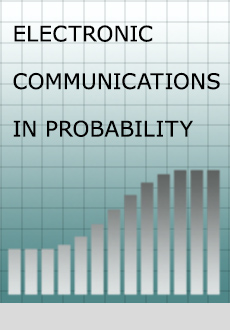Abstract
The trie-based radix sort algorithm stores pairwise different infinite binary strings in the leaves of a binary tree in a way that the Ulam-Harris coding of each leaf equals a prefix (that is, an initial segment) of the corresponding string, with the prefixes being of minimal length so that they are pairwise different. We investigate the radix sort tree chains – the tree-valued Markov chains that arise when successively storing the finite collections of random infinite binary strings $Z_1,\ldots , Z_n$, $n=1,2,\ldots $ according to the trie-based radix sort algorithm, where the source strings $Z_1, Z_2,\ldots $ are independent and identically distributed. We establish a bijective correspondence between the full Doob–Martin boundary of the radix sort tree chain with a symmetric Bernoulli source (that is, each $Z_k$ is a fair coin-tossing sequence) and the family of radix sort tree chains for which the common distribution of the $Z_k$ is a diffuse probability measure on $\{0,1\}^\infty $. In essence, our result characterizes all the ways that it is possible to condition such a chain of radix sort trees consistently on its behavior “in the large”.
Citation
Steven N. Evans. Anton Wakolbinger. "Radix sort trees in the large." Electron. Commun. Probab. 22 1 - 13, 2017. https://doi.org/10.1214/17-ECP77
Information





